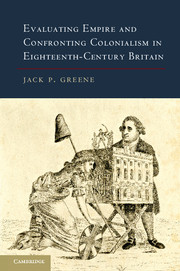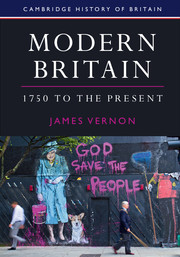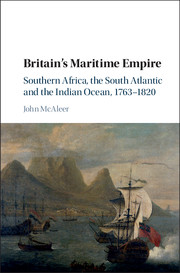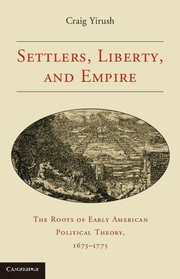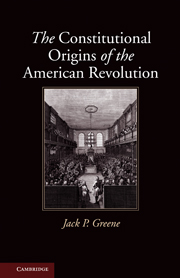Evaluating Empire and Confronting Colonialism in Eighteenth-Century Britain
$110.00 (C)
- Author: Jack P. Greene, The Johns Hopkins University
- Date Published: March 2013
- availability: Available
- format: Hardback
- isbn: 9781107030558
$
110.00
(C)
Hardback
Other available formats:
Paperback, eBook
Looking for an examination copy?
This title is not currently available for examination. However, if you are interested in the title for your course we can consider offering an examination copy. To register your interest please contact [email protected] providing details of the course you are teaching.
-
This volume comprehensively examines the ways metropolitan Britons spoke and wrote about the British Empire during the short eighteenth century, from about 1730 to 1790. The work argues that following several decades of largely uncritical celebration of the empire as a vibrant commercial entity that had made Britain prosperous and powerful, a growing familiarity with the character of overseas territories and their inhabitants during and after the Seven Years' War produced a substantial critique of empire. Evolving out of a widespread revulsion against the behaviors exhibited by many groups of Britons overseas and building on a language of “otherness” that metropolitans had used since the beginning of overseas expansion to describe its participants, the societies, and polities that Britons abroad had constructed in their new habitats, this critique used the languages of humanity and justice as standards by which to evaluate and condemn the behaviors, in turn, of East India Company servants, American slaveholders, Atlantic slave traders, Irish pensioners, absentees, oppressors of Catholics, and British political and military leaders during the American War of Independence. Although this critique represented a massive contemporary condemnation of British colonialism and manifested an impulse among metropolitans to distance themselves from imperial excesses, the benefits of empire were far too substantial to permit any turning away from it, and the moment of sensibility waned.
Read more- Emphasizes the critique of empire and its historical importance
- Comprehensive examination of how Britons celebrated and critiqued their empire during the short eighteenth century
- Most recent text from one of the most distinguished scholars of British-American history
Reviews & endorsements
"Jack Greene’s Evaluating Empire is the best study of critiques of British colonization in North America, the West Indies, Ireland, and India. He shows that many Britons used Enlightenment values of justice, humanity, and liberty to confront their compatriots’ triumphalism about commerce and power after the Seven Years’ War."
John E. Crowley, Dalhousie UniversitySee more reviews"Jack P. Greene demonstrates magisterially how the current debate on whether the British Empire was a force for good or ill began in the eighteenth century. Citing a vast range of writings he analyzes their use of different "languages" favorable or unfavorable to imperial projects in America, India, and Ireland. This novel approach convincingly establishes that colonialism was generally applauded until 1763 but thereafter was challenged by an increasing chorus of criticism."
William A. Speck, Emeritus Professor of History, University of Leeds"Whether dissecting the language of imperial grandeur or pondering critiques of imperial excess, Jack Greene has provided us with a riveting new guide to Hanoverian thinking about empire. He establishes, richly and persuasively, that when mid-to-late eighteenth-century Britons looked overseas, west or east, they saw colonialism, with all its antinomies and cruelties, some hundred years before the word was even invented. Required reading for all scholars and students of early modern empires and their afterlives."
Kathleen Wilson, State University of New York, Stony Brook"Highly recommended."
Choice"Greene offers a series of case studies of imperial issues in America, Africa, the Caribbean, Ireland, and India between the 1760s and 1790s … It provides an important context with which to understand early America …"
Andrew J. O'Shaughnessy, Journal of American History"An important book on a topic to which historians have not given due attention. Greene has done nothing short of opening up a new subfield of eighteenth-century imperial history. No doubt rich harvests will follow."
Max M. Edling, The Journal of Southern HistoryCustomer reviews
Not yet reviewed
Be the first to review
Review was not posted due to profanity
×Product details
- Date Published: March 2013
- format: Hardback
- isbn: 9781107030558
- length: 408 pages
- dimensions: 236 x 152 x 28 mm
- weight: 0.7kg
- availability: Available
Table of Contents
1. 'The principal cornucopia of Great Britain's wealth': the languages of commerce, liberty, security, and maritime supremacy and the celebration of empire
2. Outposts of 'loose vagrant people': the language of alterity in the evaluation of empire
3. 'A fabric at once the dread and wonder of the world': the languages of imperial grandeur, liberty, commerce, humanity, and justice and the American challenge to empire
4. Arenas of 'Asiatic plunder': the languages of humanity and justice and the excesses of empire in India
5. Sites of Creolean despotism: the languages of humanity and justice and the critique of colonial slavery and the African slave trade
6. 'A fruitless, bloody, wasting war': the languages of imperial grandeur. Liberty, humanity, and commerce in the American conflict
7. 'This voraginous gulph of Hibernian dependence': the languages of oppression, corruption, justice, liberty, and humanity and the identification of imperial excesses in Ireland
8. A 'shadow of our former glory'?: The discussion of empire in the wake of American secession
9. Epilogue: 'against every principle of justice, humanity, and whatever is allowed to be right among mankind': standards of humanity and the evaluation of empire.Instructors have used or reviewed this title for the following courses
- Colonial British America
- Transformation of Empire in the 18th Century
- from Confederation to Confederacy
Sorry, this resource is locked
Please register or sign in to request access. If you are having problems accessing these resources please email [email protected]
Register Sign in» Proceed
You are now leaving the Cambridge University Press website. Your eBook purchase and download will be completed by our partner www.ebooks.com. Please see the permission section of the www.ebooks.com catalogue page for details of the print & copy limits on our eBooks.
Continue ×Are you sure you want to delete your account?
This cannot be undone.
Thank you for your feedback which will help us improve our service.
If you requested a response, we will make sure to get back to you shortly.
×
